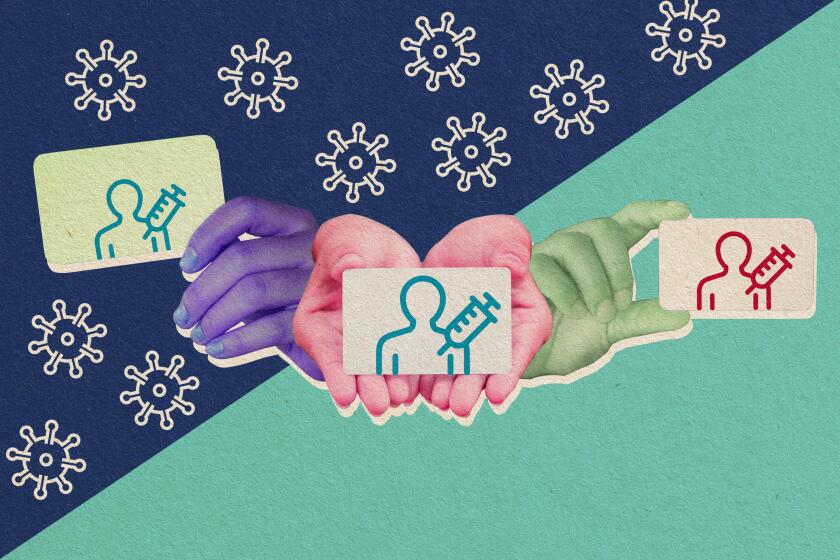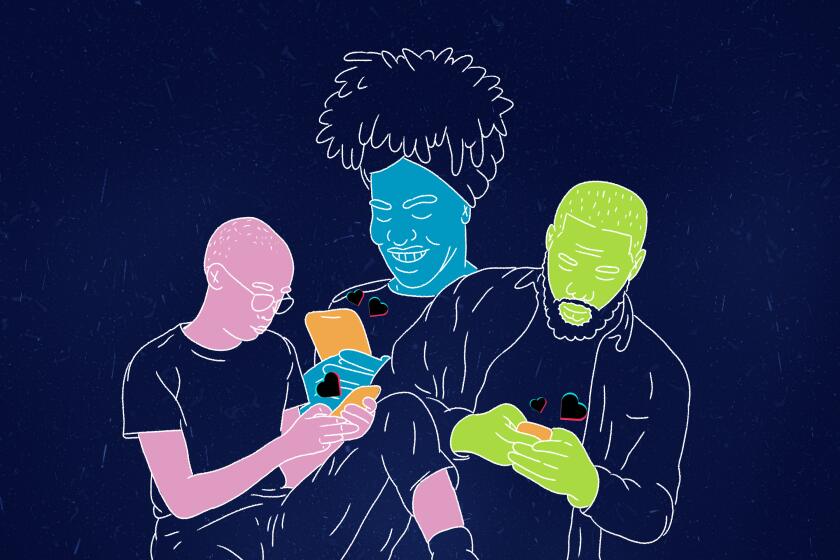Harassment is the status quo on dating sites. This woman is trying to change that
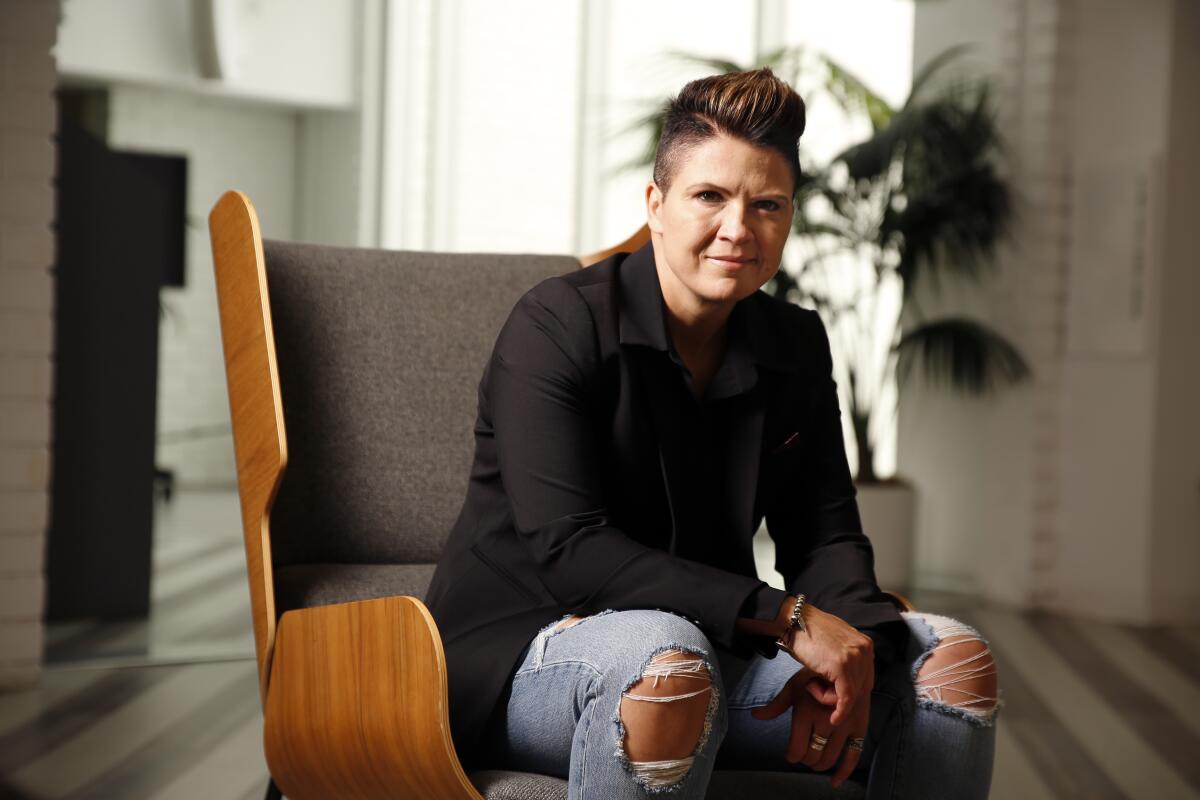
- Share via
When Tinder announced in March that they were going to start testing low-cost background checks later this year, “The Daily Show’s” Trevor Noah joked: “Before a woman goes on a date with you, she and her friends have already scrolled through your Instagram, and the Instagrams of everyone tagged on your Instagram.”
If you’ve ever used a dating app (especially if you date men), then you probably have a multi-step system for screening potential suitors, even if you don’t realize it.
Not everyone is having a Hot Vax Summer. Some daters are asking about vaccine status to gauge compatibility.
My personal checklist looks something like this: Are they lying about their age? Do they have pictures? Do they have friends in those pictures? (Or a pet? Or a living plant?) Can I find their Instagram and LinkedIn? Does my gut say this man is only capable of hurting me emotionally?
We do this because sometimes it reveals that a new beau really does like hiking, and other times you find out you’re in an episode of MTV’s “Catfish.” We do this because, for years, online dating companies looked at safety and basically said “that sounds like a personal problem”
But that sentiment has started to change. Over the past few years, thanks to external and internal pressures on tech companies to make social media apps a little less toxic, the world’s biggest dating apps have started rolling out new safety features that suggest they think this is their problem too.
No one expects apps like Tinder — especially not Tinder — to end harassment and gender-based violence, but we at least expect the apps to care about safety as much we do. That is, after all, the foundation of any good relationship.
*
Last fall, Match Group — which owns Tinder and nearly every other dating app you’ve found love or been ghosted on — hired Tracey Breeden to lead safety and social advocacy.
You can learn a lot about a person — or at least a lot about how they want to be perceived — by their video chat set up. When I first spoke with Breeden this spring she was sitting in the office of her one-story ranch-style Phoenix home she shares with her partner, her niece, two dogs and a cat named Shadow. Breeden was wearing an “Empowered Women Empower Women” shirt. And in the background hung “Moving Forward,” one of several paintings she owns by Dana Tiger, a Muscogee Nation artist from her home state of Oklahoma known for depictions of strong Native American women.
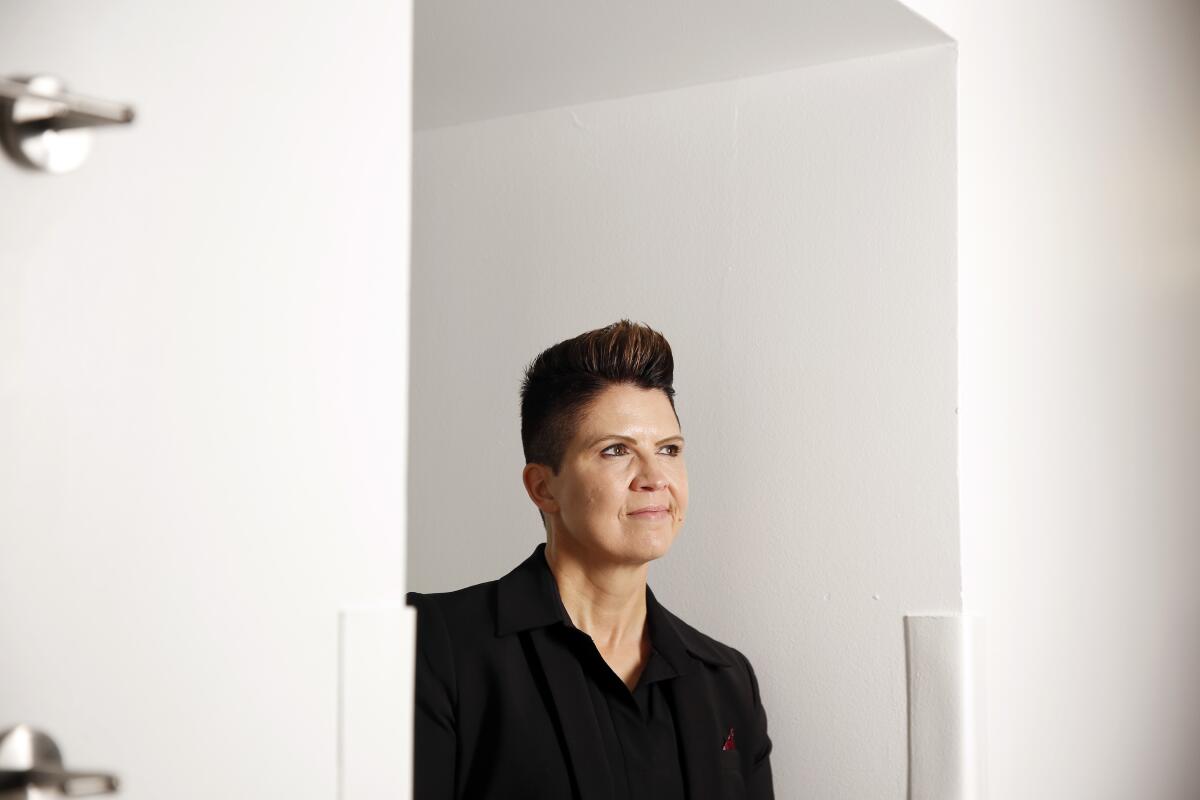
Officially, Breeden’s job at Match Group is to coordinate safety efforts across the company’s vast app empire and find organizations to cut down on in-app harassment and off-the-app violence. That’s led to her spearheading the background check partnership; bringing in a domestic violence prevention group to review the way harassment is supported and advising on Tinder features like “Are You Sure?” (a warning for out-of-pocket messages); the ability to block contacts; and plans to introduce optional ID verification next year.
“When you look at the dating industry as a whole, there’s a lot of work that needs to be done in the space,” Breeden said. “This online environment, even outside of the dating industry, is a wild, wild West.”
The odds of receiving an unwanted message on a dating app — from overly sexual comments to threats — is high. According to an October 2019 Pew Research Center survey, 57% of women on dating apps ages 18 to 34 said someone had sent them a sexually explicit image or message they didn’t ask for, 44% said they’ve been called an offensive name and 19% said someone had threatened to physically harm them.
A few years ago I matched with a man on Tinder named Jim, who according to his bio, had a job and a car and liked bourbon. When I failed to respond to his “hello there cutie” greeting within 12 hours, he followed up with: “Alright does this get your attention...I might not be mr right but I’ll f— you till he gets here.”
I put myself in Jim’s shoes to test out Tinder’s “Are You Sure?” feature in an in-app conversation with a Match Group spokesperson. The product, released in May, uses artificial intelligence, informed by what users reported in the past, to send a gentle warning to a user before they send a potentially offensive message.
When I attempted to send Jim’s uncensored message, I received the following prompt: “Slow down — your match may find this language disrespectful. Are you sure you want to send?”
Here’s part of the challenge: Sometimes, especially on Tinder, you’re not waiting for Mr. Right and what warrants a block from one person might be welcomed by another. And either way, the warning is just that, a polite suggestion. I was able to ignore the message. Existing research shows that nudging people in the right direction before they hit send can have a small impact. Match Group’s data shows that AYS has helped reduce inappropriate messages by 10%.
Behind-the-scenes of TikTok university for Black creators.
For the other 90% of messages, there’s unmatching, blocking and reporting.
“Are You Sure” builds off of “Does This Bother You,” a January 2020 feature that prompts users to report someone who sends them an inappropriate message. When I tried to unmatch a Tinder user, the app also led me through a series of reporting prompts: Had someone been physically harmed? Was there abusive behavior? Was someone selling something? (ex. OnlyFans.) Maybe there was nudity, or a user was younger than 18 or had a profile that was fake. Only after scrolling through those options could you say you’re just not interested. If you do need to report, some options ask whether the person you’re reporting hurt you or a friend, or whether someone is threatening self-harm. (Earlier this year RAINN, the Rape, Abuse & Incest National Network, assessed Tinder, Hinge and Plenty of Fish’s reporting systems. Based on their recommendations Match Group provides more information to users throughout the reporting process and gives moderators more training.)
In most cases, Breeden and Match Group’s approach focuses on education and giving people the chance to opt in to features. But some say they should play a bigger role.
Kat Lo, a content moderation lead at Meedan, a nonprofit software company working to make information more accessible, thinks that dating apps have “a higher standard of care” when it comes to safety because of the role they play in putting vulnerable people in harm’s way. “I never think that social media companies are doing enough to protect users,” she said.
Nancy Jo Sales, best known for writing the Vanity Fair article that inspired Sofia Coppola’s 2013 film “The Bling Ring,” is one of the most vocal critics of the dating app industry. She argues that Big Dating companies like Match Group aren’t more aggressive about kicking people off their platforms because removing accounts conflicts with the goal to gain more subscribers. In her view, users should be banned from the app for inappropriate content and background checks should be funded by Match Group. All dating apps — at the very least — should be screening people and running age checks to make sure minors aren’t on the apps, she said.
“They need to vet people,” said Sales. “It is called Match Group because they are online matchmakers.”
*
Besides its namesake Match, the company owns more than a dozen dating brands, including Tinder, Hinge, OkCupid, Plenty of Fish, BLK and OurTime, as well as popular dating apps from around the world like Europe’s Meetic, Japan’s Pairs and Brazil’s Parperfeito. In the U.S. the most popular dating apps not in the Match sphere are more exclusive apps like Raya and The League; LGBTQ apps like Her and Grindr; Coffee Meets Bagel and Bumble, which was founded by a former Tinder employee.
This means that what Breeden does at Match Group will influence the entire dating industry because Match Group basically is the online dating industry, and online dating is increasingly becoming the way people meet.
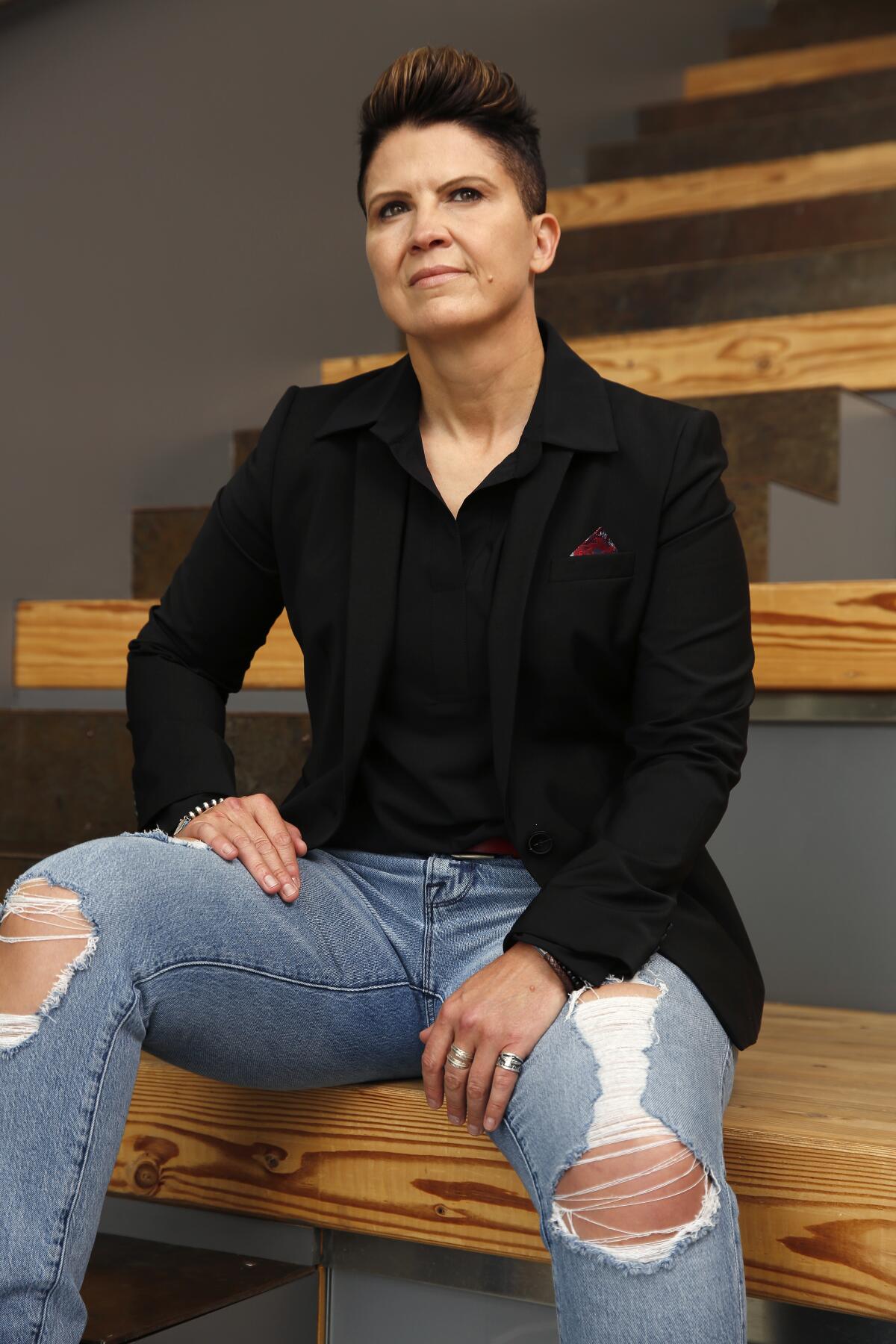
When Breeden joined Uber in 2016, the company was, in her words, in the middle of a “hot mess” of a situation. “They were certainly not appropriately responding to sexual assault and harassment that was occurring,” Breeden said. One of her first tasks was fixing the company’s relationship with RAINN. RAINN co-founder Scott Berkowitz remembers being “skeptical” when re-engaging at first — earlier discussions to partner on training had fallen through — but with Breeden, he said, “their commitment was so clear.” “It‘s just so obvious that she’s driven by the right impulses.”
Breeden — who spent more than a decade as a law enforcement officer with the California Highway Patrol, the Tulsa County Sheriff’s Office and Glendale, Ariz.’s police department — likes to say she takes a community policing approach to online safety. She brings in experts like RAINN and builds coalitions with outside groups. Those who’ve worked with Breeden say she’s figured out how to seamlessly transition between being a safety advocate for marginalized groups and a pragmatic business executive in the tech space.
“She has the type of personality where she can be giving this speech right now to an executive team, but then ... just have this fresh and on-the-ground approach with a grassroots organization because of her passion,” said Pamela Zaballa, the global executive director of NO MORE, a public awareness initiative to end domestic violence and sexual assault.
Another challenge was figuring out the scale of the problem. In 2019, Uber released its first safety transparency report, which disclosed that drivers and passengers had reported nearly 6,000 instances of sexual assault in 2017 and 2018. (Match Group plans to release a similar safety report in 2022.)
The dating industry had its own issues. As a series of ProPublica exposés published in recent years revealed, a litany of safety issues plague major dating companies: Free apps like Tinder don’t check if members are known sex offenders, survivors who reported their attackers said they didn’t hear anything from the companies and sometimes saw the offenders return to the apps, and moderators said they were unequipped to properly respond to the reports they received.
Looking at the industry’s dysfunction, Breeden thought, “what an environment.” This was an opportunity. “I really felt like that prioritization of women, people of color and marginalized groups’ safety wasn’t necessarily there, and it’s not typically anywhere,” she said.
She was brought to Match Group in 2020 to “elevate the conversation about online safety more broadly,” said Shar Dubey, Match Group’s chief executive. A big part of that means finding a middle ground between critics who say companies like Match aren’t doing enough to keep users safe and online daters who don’t trust platforms with their data or their wellbeing.
*
So much of dating is about trying to figure out who someone is at their core and constantly re-evaluating whether you want to keep getting to know them based on the information you have. Online dating intensifies that — it broadens the pool of people you’re exposed to beyond immediate geography and personal connections such as co-workers, neighbors and friends of friends. But it also gives you more information about someone than you’d get from a missed connection at Whole Foods. Within minutes of matching with someone, you can find out where they work, who their friends are, what their exes look like.
Breeden’s biggest push at Match Group has been the partnership between Tinder and Garbo, a nonprofit background check company. Under the deal, Match Group made a “seven-figure” investment in Garbo to get it ready. Beta testing starts this fall; users will have the option to pay less than the cost of “a cup of coffee” to run checks on potential dates, she said.
“I know this from working in law enforcement, working in this space, being an expert in this space: There is no easy solution,” Breeden said. “You can’t point to somebody and say, well, that person is going to commit gender-based violence, or that person’s going to create harm.”
Kathryn Kosmides, a former marketing executive, started Garbo after her experience with gender-based violence and having to file a protective order against an ex-boyfriend she met on Tinder. She pitched her company as an alternative to the “stalking as a service” world of background checks that exists now. Garbo won’t give out address information, it will exclude certain traffic and drug violations which disproportionately impact minorities and it will allow users to submit verifiable documents like restraining orders, civil suits or police reports since most cases of domestic violence and sexual assault don’t end in conviction.
“Like any digital platform, there’s inherent risk if you’re meeting strangers,” Kosmides said. “But the majority of people on a bell curve are just looking for a date — a happy, healthy date. And so we really focus on that, and then try to really prevent the negative things from occurring.”
While news outlets made a big deal of the announcement in March, it’s not clear how the background checks will play out. A May YouGov poll that came out after the Garbo news found that 60% of adults surveyed (including people who aren’t actively dating or have never used a dating app) said that dating apps should help users run background checks. Of people who actually have used dating apps, 13% of women and 6% of men said they’d previously run background checks on dates.
It also brings up the central conflict many women and people in vulnerable circumstances face in their romantic lives: choosing between intimacy and safety, both of which are rooted in trust. You want to trust people enough to think a background check isn’t necessary, but part of you is worried you’ll regret not knowing. For better or worse, Match Group is leaving the decision in our hands.
In interviews with friends, my therapist and single people, some women have said they’d screen everyone and their mom, others said the idea of screening someone before a date seemed odd. One 6’4” gentleman told me he couldn’t see himself spending money on a background check because he’s, well, 6’4”, but he understood why a woman would. Several people wondered why users, most likely women who date men, have to pay for this or why it’s not just integrated. (Breeden says she isn’t aware of a model that offers background checks for free — Garbo has to pay for the data, and payments will go directly to Garbo. )
When I asked Breeden about some of the criticisms being raised against the Garbo partnership, she said she was glad people were having “meaningful conversations” about safety but stressed that people should have the option to access it. It’s not a perfect system, in part because Breeden says she doesn’t believe in letting perfect be the enemy of the good. But she hopes it’s better than what we have now.
“Safety is not easy ... and because it’s not easy, a lot of people sit back and they do nothing, or they’re quiet because they don’t want to have to get in the middle to have those difficult conversations, to be in the middle of that difficult tension and that journey,” she said. “I want to drive and create safe spaces for people, and I know out in this world there’s a whole lot of spaces that are not safe.”
More to Read
Sign up for The Wild
We’ll help you find the best places to hike, bike and run, as well as the perfect silent spots for meditation and yoga.
You may occasionally receive promotional content from the Los Angeles Times.
